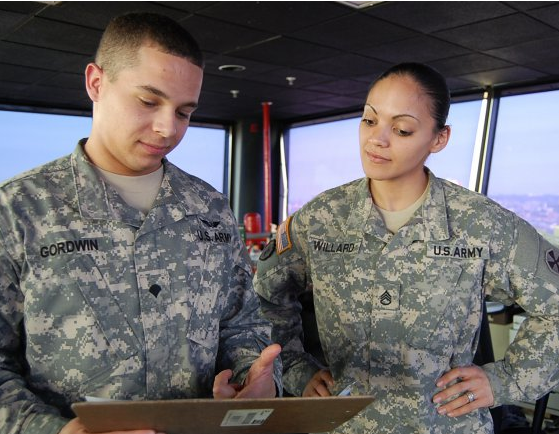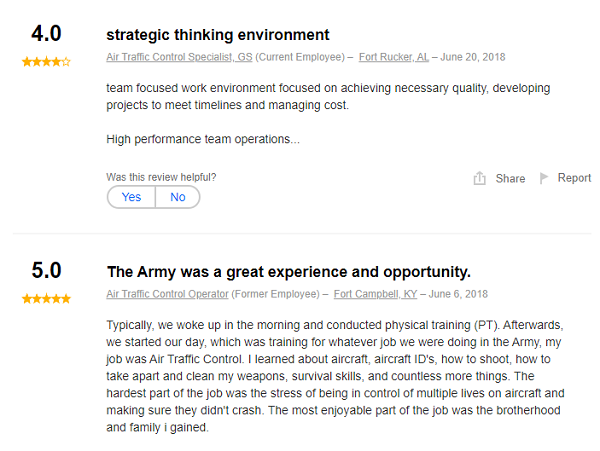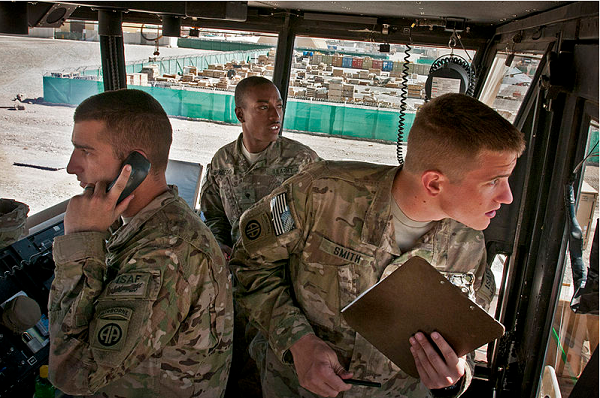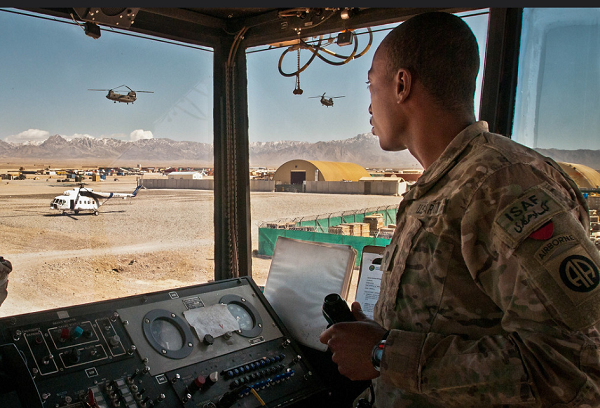An Army Air Traffic Control Operator (MOS 15Q) controls airborne and ground traffic.
The soldiers in the Air Traffic Control (ATC) Operator position guide planes through landing and takeoff instructions.
These individuals can be at air traffic control facilities anywhere around the world.
Qualifications and Training
To enter into this position a score of 101 on the Skilled Technical (ST) ASVAB test is required.
Recruits will attend Basic Combat Training for 10 weeks.
After successful completion of Basic Combat Training, recruits will attend 15 weeks of Advanced Individual Training at the US Army Center of Excellence at Fort Novosel, Alabama.
Helpful skills for the ATC Operator position:
- Ability to remain calm in stressful situations and work as a team member
- Interest in working in positions that require accuracy and attention to detail
- Ability to have decisiveness and work within strict standards
Related Article – Army Ranks and Pay
Duty Stations
Those serving in the Army in MOS 15Q can expect to be potentially based at one of the following duty stations:
Inside the Continental US (CONUS)
- Fort Bliss, TX
- Fort Campbell, KY
- Fort Carson, CO
- Fort Cavazos, TX
- Fort Drum, NY
- Fort Hunter Liggett, CA
- Fort Johnson, LA
- Fort Leonard Wood, MO
- Fort Liberty, NC
- Fort McCoy, WI
- Fort Novosel, AL
- Fort Riley, KS
- Fort Sill, OK
- Fort Stewart, GA
- Joint Base Lewis-McChord, WA
Outside the Continental US (OCONUS)
- Fort Wainwright, AK
- USAG Ansbach, Germany
- USAG Bavaria, Germany
- USAG Hawaii
- USAG Humphreys, South Korea
- USAG Wiesbaden, Germany
- USAG Yongsan-Casey, South Korea
What does an Air Traffic Control Operator do?

An Air Traffic Control (ATC) Operator is a position that requires attention to detail and the ability to make high-risk decisions while in a stressful environment.
The ATC Operator is responsible for tracking planes in both tactical and non-tactical environments.
They process flight plan data and maintenance logs.
They also refer to records, files, and tape recordings of voice communications to complete their job.
These specialists work in air traffic control facilities.
Part of their job is to assist in the installation and relocation of mobile air traffic control facilities in locations all around the world.
It is important for the Air Traffic Control Operator to understand air traffic control management operational procedures.
These procedures include proper takeoff, landing, and ground control procedures.
It is their responsibility to use this knowledge to make decisions and guide pilots to correct landing or takeoff positions.
They also must know proper communications, radar procedures, and aircraft management systems.
The specialist will use proper communication language and techniques to quickly and effectively communicate with pilots and other operators.
The soldiers use radar procedures to track the aircraft and surrounding ones, to avoid conflict during flight, takeoff, or landing.
It is important that they know how to identify all types of aircraft and aircraft markings.
ATC Operators will use visual flight rules (VFR), instrument flight rules (IFR), and special visual flight rules (SVFR) to supervise and control the flight.
This position requires a high level of multi-tasking, as you will have communication with the aircraft while writing down data and listening to other communication channels all at the same time.
You can view more details on the Air Traffic Control Operator position by viewing the video from the Army below.
What Does an Air Traffic Control Operator (MOS 15Q) Get Paid?
Air Traffic Control Operator is an entry-level position, like all Army Enlisted MOS fields.
With no prior Military experience or education, you can expect to be paid on the lower end of the base pay table for the Army (found below).
| Insignia | Pay Grade | Rank | Abbreviation | Minimum Monthly Pay |
|---|---|---|---|---|
| E-1 +4 months | Private | PVT | $1,917.60 | |
| E-2 | Private Second Class | PV2 | $2,149.20 | |
| E-3 | Private First Class | PFC | $2,259.90 | |
| E-4 | Specialist | SPC | $2,503.50 | |
| E-4 | Corporal | CPL | $2,503.50 | |
| E-5 | Sergeant | SGT | $2,730.30 | |
| E-6 | Staff Sergeant | SSG | $2,980.50 | |
| E-7 | Sergeant First Class | SFC | $3,445.80 | |
| E-8 | Master Sergeant | MSG | $4,957.20 | |
| E-8 | First Sergeant | 1SG | $4,957.20 | |
| E-9 | Sergeant Major | SGM | $6,055.50 | |
| E-9 | Command Sergeant Major | CSM | $6,055.50 | |
| E-9 | Sergeant Major of the Army | SMA | $6,055.50 |
As you gain skills in your position and advance in rank, your pay will increase as well.
In addition to the pay above, there are additional benefits and allowances that should be accounted into your pay.
Related Article: Which Branch Of The Military Should I Join? 7 Things To Consider
Benefits
The Army offers compensation benefits that greatly add to the income you will be receiving.
The Army offers free housing and food to those who live on base, They offer a housing and grocery allowance to those authorized to live off base.
They also provide an annual uniform allowance that goes towards military clothing or civilian clothing if the job requires it.
There are also bonuses for certain positions or for entering training by a certain date.
There may be times when special pay is offered such as deployment scenarios.
The Army also offers:
- Insurance: Free to low-cost medical and dental; paid sick time; low-cost life insurance
- Vacation: 30 days paid
- Education: Tuition assistance, scholarship opportunities, and allowances for books/fees
Job Reviews
This position has very positive reviews.
Individuals like the fast-paced environment and found their work very rewarding.
Positive reviews discuss this position as providing a strategic thinking environment.
Negative reviews discuss the lengthy deployments and odd hours.
You can find a few reviews of the ATC Operator position below.

Related Article – Military OneSource: Your Go-To Guide
Civilian Career Opportunities
This position opens the door to a career in aviation as a civilian.
You receive the same FAA certifications that you do as a civilian.
The skills learned in Air Traffic Control directly relate to Air Traffic Control as a civilian.
You can find work in airports, traffic control centers, and even for the Department of Defense.
This position also qualifies for the PAYS program, which is a program that guarantees an interview with military-friendly companies.
Summary

An Army Air Traffic Control Operator (MOS 15Q) is responsible for communicating and guiding air traffic.
This is an entry-level position that requires Basic Combat Training and lengthy individual training.
The Army offers base pay, allowances, compensation, and potential bonuses.
People who previously held this position enjoyed it.
This job directly relates to air traffic control positions as a civilian.
Related Article – Air Force Special Missions Aviation (1A9x1): Career Details
References:
- Replacing Dog Tags: 6 Things You Need to Know - June 28, 2024
- Navy OAR Test Study Guide - June 24, 2024
- 10 Best Sniper Movies of all Time - June 20, 2024
General FAQ
How much do Army Air Traffic Controllers make?
All Army personnel are paid according to their rank and time in service. As an Army Air Traffic Control Operator (MOS 15Q), considered an in-demand job, however, you may be eligible for bonuses.
How do you become an Air Traffic Controller in the military?
To qualify as an Army Air Traffic Control Operator (MOS 15Q), you’ll need to score 101 or better on the Skilled Technical portion of the ASVAB. Training is 15 weeks at Fort Novosel, Alabama.
Do you need FAA certificate to be an Army 15Q?
You’ll need to qualify for the FAA control tower operator's certificate to become an Army Air traffic controller.
Which branches of the U.S. military have Air Traffic Controllers?
All branches of the U.S. Armed Forces have air traffic controller positions and training, except for the Coast Guard.
Can you skip MOS school to become an Army Air traffic controller?
If you have a valid FAA control tower operator's certificate and two years’ experience, you may be able to bypass AIT to become an Army 15Q.
Originally posted on September 28, 2019 @ 4:32 pm
Affiliate Disclosure: This post may contain affiliate links. If you click and purchase, I may receive a small commission at no extra cost to you. I only recommend products I have personally vetted. Learn more.
